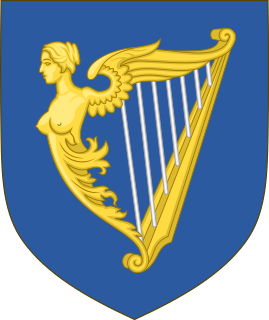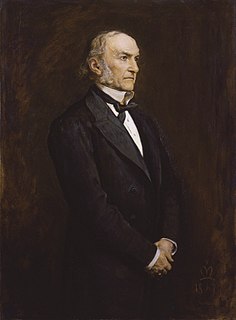Related Research Articles

Charles Stewart Parnell was an Irish nationalist politician who served as a Member of Parliament (MP) from 1875 to 1891, also acting as Leader of the Home Rule League from 1880 to 1882 and then Leader of the Irish Parliamentary Party from 1882 to 1891. His party held the balance of power in the House of Commons during the Home Rule debates of 1885–1886.

The Irish general election of 1918 was the part of the 1918 United Kingdom general election which took place in Ireland. It is now seen as a key moment in modern Irish history because it saw the overwhelming defeat of the moderate nationalist Irish Parliamentary Party (IPP), which had dominated the Irish political landscape since the 1880s, and a landslide victory for the radical Sinn Féin party. Sinn Féin had never stood in a general election, but had won six seats in by-elections in 1917–18. The party had vowed in its manifesto to establish an independent Irish Republic. In Ulster, however, the Unionist Party was the most successful party.

The Irish Parliamentary Party was formed in 1874 by Isaac Butt, the leader of the Nationalist Party, replacing the Home Rule League, as official parliamentary party for Irish nationalist Members of Parliament (MPs) elected to the House of Commons at Westminster within the United Kingdom of Great Britain and Ireland up until 1918. Its central objectives were legislative independence for Ireland and land reform. Its constitutional movement was instrumental in laying the groundwork for Irish self-government through three Irish Home Rule bills.

The 1874 United Kingdom general election saw the incumbent Liberals, led by William Gladstone, lose decisively, even though it won a majority of the votes cast. Benjamin Disraeli's Conservatives won the majority of seats in the House of Commons, largely because they won a number of uncontested seats. It was the first Conservative victory in a general election since 1841. Gladstone's decision to call an election surprised his colleagues, for they were aware of large sectors of discontent in their coalition. For example, the nonconformists were upset with education policies; many working-class people disliked the new trade union laws and the restrictions on drinking. The Conservatives were making gains in the middle-class, Gladstone wanted to abolish the income tax, but failed to carry his own cabinet. The result was a disaster for the Liberals, who went from 387 MPs to only 242. Conservatives jumped from 271 to 350. For the first time the Irish nationalists would be elected. Gladstone himself noted: "We have been swept away in a torrent of gin and beer"

The Home Rule League (1873–1882), sometimes called the Home Rule Party, was an Irish political party which campaigned for home rule for Ireland within the United Kingdom of Great Britain and Ireland, until it was replaced by the Irish Parliamentary Party. The Home Rule Confederation of Great Britain was a sister organisation in Great Britain.
The Nationalist Party was a term commonly used to describe a number of parliamentary political parties and constituency organisations supportive of Home Rule for Ireland from 1874 to 1922. It was also the name of the main Irish nationalist Nationalist Party in Northern Ireland from 1921 to 1978.

Gladstonian liberalism is a political doctrine named after the British Victorian Prime Minister and leader of the Liberal Party, William Ewart Gladstone. Gladstonian liberalism consisted of limited government expenditure and low taxation whilst making sure government had balanced budgets and the classical liberal stress on self-help and freedom of choice. Gladstonian liberalism also emphasised free trade, little government intervention in the economy and equality of opportunity through institutional reform. It is referred to as laissez-faire or classical liberalism in the United Kingdom and is often compared to Thatcherism.
The Catholic Union was a political organisation in Ireland in the 1870s. It was the brainchild of Paul Cullen, Roman Catholic Archbishop of Dublin and future Irish cardinal. He created it in 1872 to link growing public interest in politics and Irish nationalism with a Catholic agenda. It was his second attempt to create a Church-orientated political party, following the collapse and failure of his first such organisation, the National Association.
Sir Joseph Neale McKenna was an Irish banker and politician whose career extended from the elite home rule politics of the mid-nineteenth century to the fall of Charles Stewart Parnell, whom he supported in later years.
William Shaw was an Irish Protestant nationalist politician. He was a Member of Parliament (MP) in the House of Commons of the United Kingdom of Great Britain and Ireland and one of the founders of the Irish home rule movement.

The Irish Home Rule movement was a movement that campaigned for self-government for Ireland within the United Kingdom of Great Britain and Ireland. It was the dominant political movement of Irish nationalism from 1870 to the end of World War I.
The Wick Burghs by-election was a Parliamentary by-election. It was a Scottish Highland constituency that returned one Member of Parliament (MP) to the House of Commons of the United Kingdom, elected by the first past the post voting system. The constituency was a district of burghs representing the parliamentary burghs of Cromarty, Dingwall, Dornoch, Kirkwall, Tain and Wick. The by-election took place during the third anniversary of the Liberal Government's re-election of December 1910. It was thought to be a key indicator to the outcome of the following general election anticipated to take place in 1914-15.
The Midlothian by-election was a Parliamentary by-election. It returned one Member of Parliament (MP) to the House of Commons of the United Kingdom, elected by the first past the post voting system.
The Londonderry City by-election of 1872 was held on 23 November following the resignation of incumbent Liberal Party member of parliament Richard Dowse to become a Baron of the Exchequer. The Liberal vote was split as their candidate, Christopher Palles, was considered by Catholics as a "priest-hunter" for his prosecution of clergy as Attorney-General and denounced by Protestants for his views on education along denominational lines. The election was won by the Irish Conservative Party's Charles Lewis who secured a 174-vote majority. The election was the first Irish election to the British Parliament to be held by secret ballot.
A by-election was held on 20 January 1877 for the UK House of Commons constituency of Waterford County to fill the vacancy caused by the death of Home Rule League MP Sir John Esmonde, one of the two members returned in the 1874 general election. The by-election was won by the Home Rule candidate, James Delahunty.
The 1876 Leitrim by-election was fought on 14 July 1876. The byelection was fought due to the succession to a peerage of the incumbent Conservative MP, William Ormsby-Gore. It was won by the Home Rule candidate Francis O'Beirne.
The 1874 Galway Borough by-election was held on 29 June 1874. The byelection was held due to the void Election of the incumbent Home Rule MP, Frank Hugh O'Donnell, in the March By-election. It was won by the Home Rule candidate Michael Francis Ward.
The 1874 Mayo by-election was fought on 29 May 1874. The byelection was fought due to the void Election of the incumbent Home Rule MP, George Ekins Browne. It was retained by Browne.
The Stroud by-election of May was fought on 15 May 1874. Caused by the election of Liberal MP, Sebastian Stewart Dickinson being declared void on petition on "account of treating, but the treating was not with knowledge of the candidates". It was retained by the Liberals.

The 1874 Dublin County by-election was fought on 18 March 1874. The byelection was fought due to the incumbent Conservative MP, Thomas Edward Taylor, becoming Chancellor of the Duchy of Lancaster. It was retained by the incumbent.
References
- ↑ Leigh Rayment's Historical List of MPs
- ↑ Walker, B.M., ed. (1978). Parliamentary Election Results in Ireland, 1801-1922. Dublin: Royal Irish Academy. ISBN 0901714127.